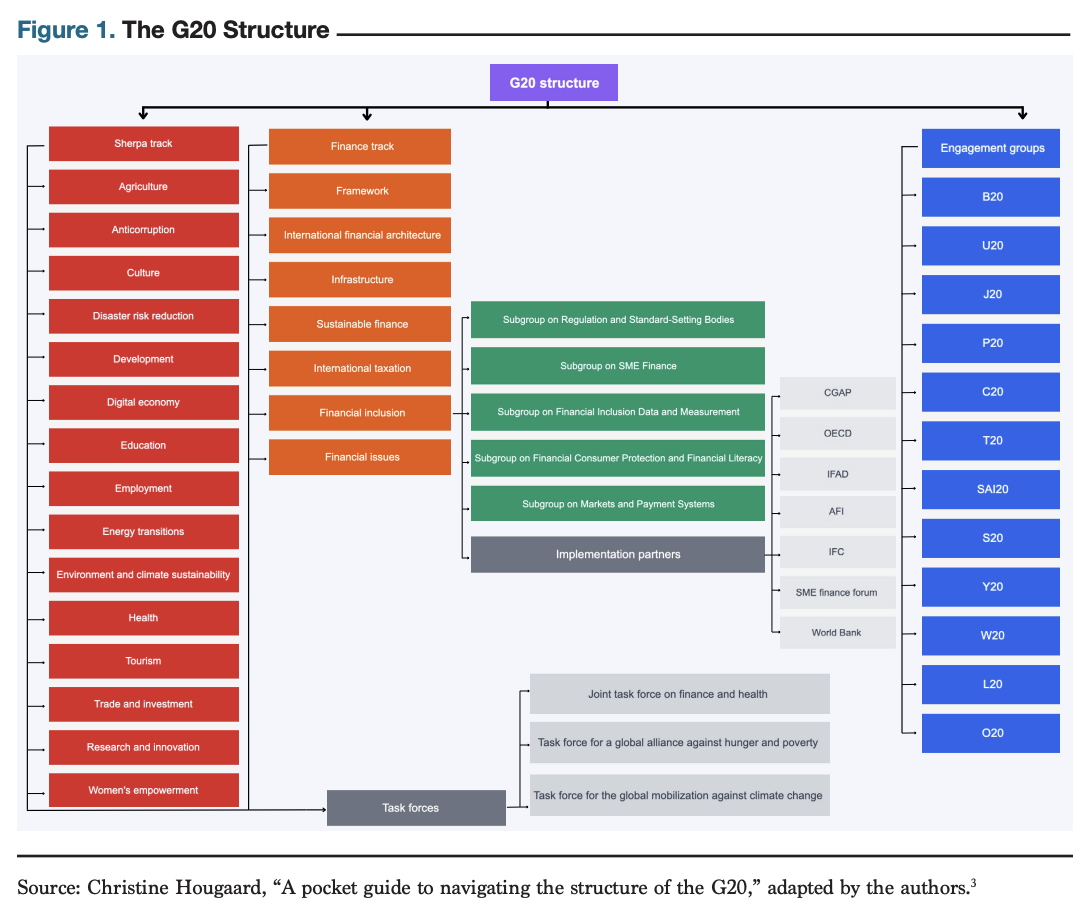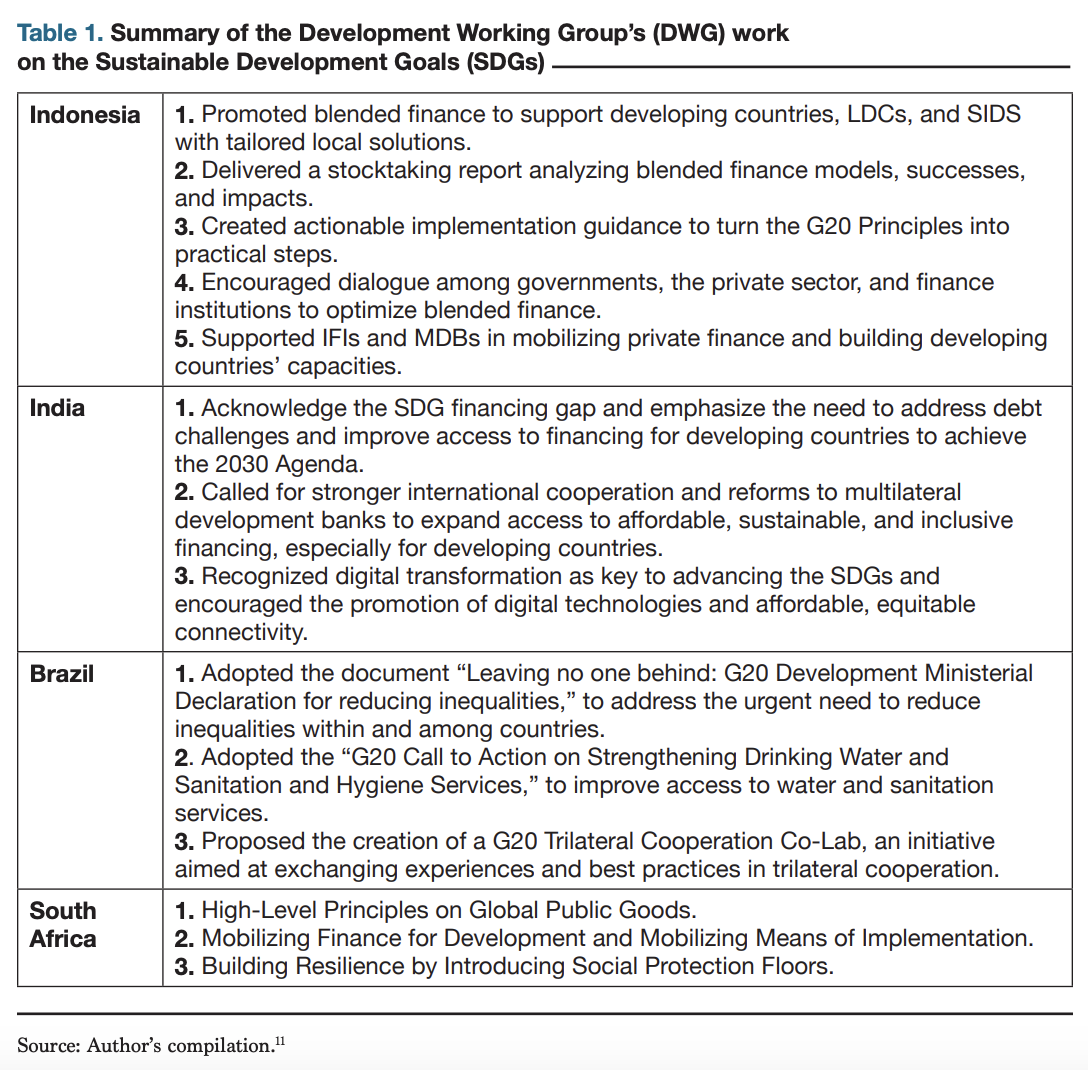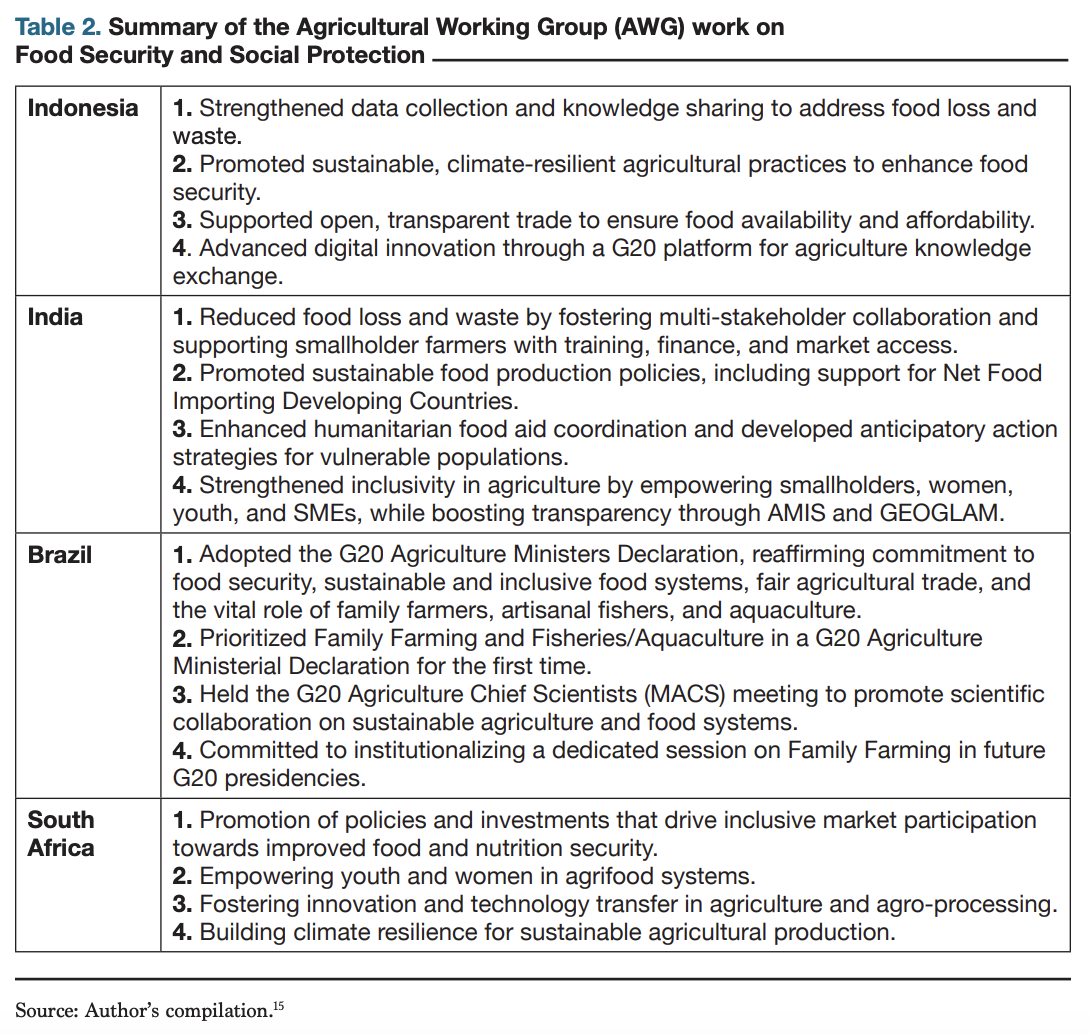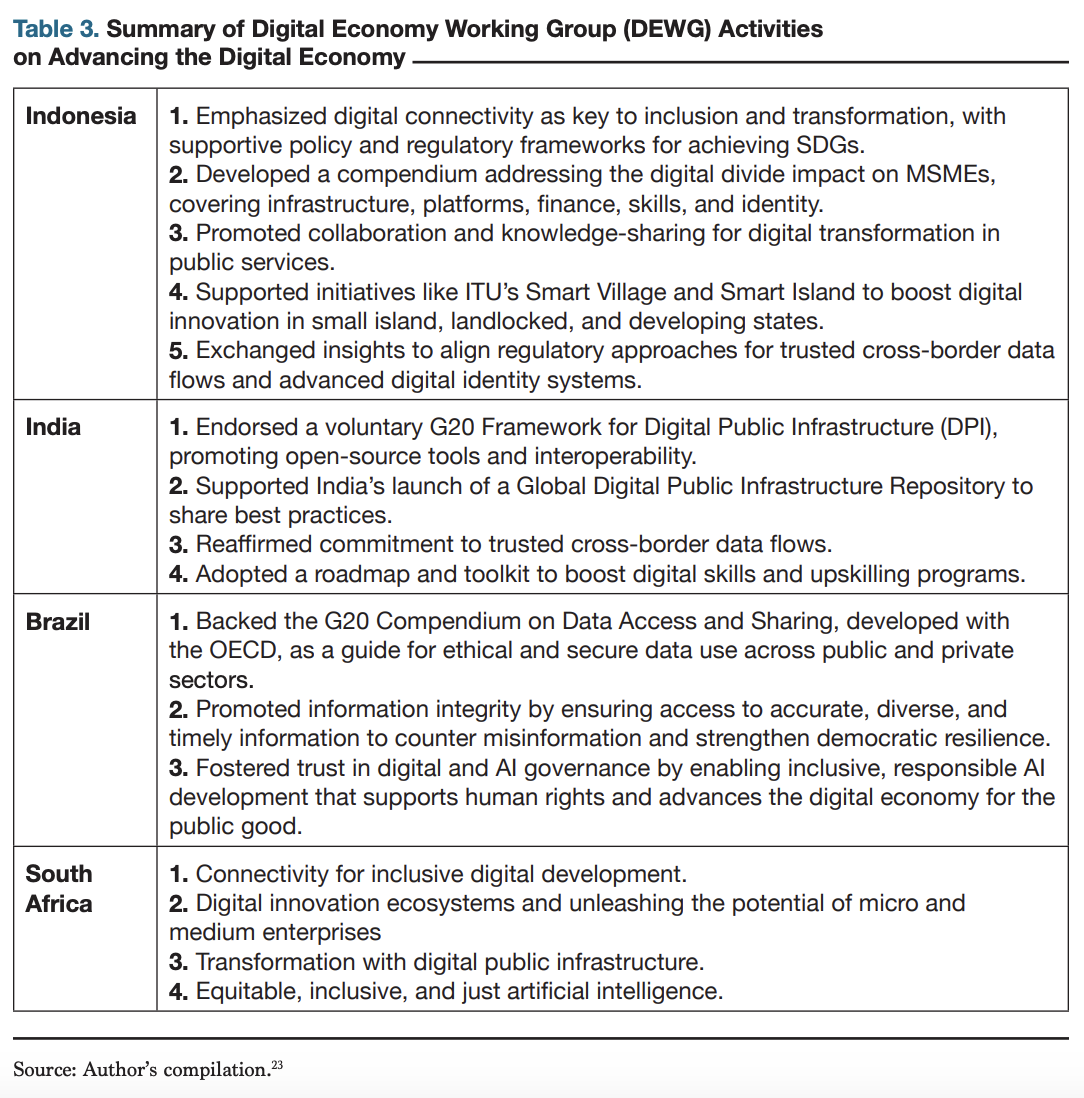Background Paper No. 34
BY Anit Mukherjee and caroline arkalji
EXECUTIVE SUMMARY
Starting in 2022, the consecutive G20 presidencies of Indonesia followed by India, Brazil, and South Africa (IBSA) mark a pivotal moment to re-anchor the group’s priorities to those of the Global South. Together, these countries have championed a revival of the development agenda centered on accelerating progress towards the sustainable development goals (SDG), food security, digital public infrastructure, and climate action, during a time of waning multilateralism, rising inequality, and stalled progress on global goals.
To translate political momentum generated by Indonesia’s presidency into durable mechanisms, the IBSA presidencies leveraged the G20 Troika and working group structures to align policy agendas, launch targeted initiatives, and institutionalize development priorities. Drawing on Leaders’ Declarations and working group outputs, this paper maps how this agenda translated into institutional outcomes. These include blended finance principles for climate mitigation and adaptation advanced by Indonesia, India’s digital public infrastructure (DPI) framework for inclusive digital transformation, the Deccan Principles on food security and Brazil’s focus on ending hunger and poverty, and addressing the challenges of inequality and sustainability that is a key area of focus for South Africa’s G20 presidency. Cross-cutting platforms such as the Global Biofuels Alliance and the Global Alliance Against Hunger and Poverty further consolidated continuity into actionable frameworks for collaboration both within the G20 and beyond.
Rather than isolated national agendas, these presidencies reflect coordinated Global South leadership that embedded development within the G20’s institutional architecture. Their collective efforts provide a model for sustained influence in multilateral governance, centered not on rhetoric but on agenda-setting, alignment of priorities, and concrete goals to stimulate innovation and action in global governance, sustainable development, digital transformation, and climate change.
I. INTRODUCTION
In November 2022, India took over the G20 presidency from Indonesia, followed by Brazil and South Africa. The consecutive Global South presidencies presented a unique opportunity for the four countries to resurrect the development agenda for the G20 collectively. At a time when the world was recovering from the disruption caused by the global pandemic, facing increasing food insecurity, debt stress, and adverse effects of climate change, the four presidencies have focused attention on the challenges and priorities of the Global South. More importantly, it has ensured policy continuity through the leadership transitions and consolidated the development agenda for the G20.
Policy continuity across presidencies has been a key challenge for the G20. Although the G20 has offered a valuable platform for agenda-setting and coordination among countries that constitute nearly 85 percent of global gross domestic product, its commitments are non-binding and operate on a voluntary, consensus-based model. Therefore, implementation depends largely on the political will of individual member states, which limits enforcement and continuity.
Without a permanent secretariat, the mechanism of the G20 Troika comprising the past, current, and future presidencies was designed to carry forward the commitments and proposals from one presidency to the next. However, in practice, the G20 agenda has been set and driven by current presidents and often reflects their own priorities and issues that demand immediate attention – the global financial crisis and the COVID-19 pandemic, for example. It has, therefore, been difficult to mobilize the international community to translate the Leader’s Declarations, high-level principles, and outcome documents into action over a sustained period of time.
The last four Global South presidencies have tried to address this institutional shortcoming that limited the effectiveness of the G20 as a forum for action. Working together, the IBSA+Indonesia presidencies have been able to translate policy continuity into new institutions which will continue to advance development goals in the Global South. To address the debt crisis and the need for low-cost, sustainable finance in the Global South, India’s presidency convened an independent Expert Group tasked with developing a detailed roadmap to increase development assistance and reform the multilateral development banks. India and Brazil’s G20 presidencies launched the Global Alliance Against Hunger and Poverty, the Global Biofuels Initiative, and highlighted the role of digital public infrastructure for inclusive digital transformation in countries of the Global South. As South Africa takes over the presidency of the G20 in 2025, marking the first G20 meeting on African soil, it has a unique opportunity to elevate African voices into the deliberations, consolidating the focus on development achieved over the past three years.
Resurrecting the development agenda within the G20 and ensuring policy continuity across the Global South presidencies has not been an easy task. While the Leader’s Declarations themselves have been an achievement given the complex geopolitical context, the groundwork was laid by the four countries coordinating their positions in the numerous working groups and task forces that provide inputs into the negotiations in the Leader’s Summit.
This paper analyzes the process through which the policy continuity was achieved. To do this, we first explain the organizational structure of the G20 in Section II. To analyze G20’s pivot to development, we limit the scope of the paper to four key priorities mentioned in the Bali, New Delhi, and Rio de Janeiro Leaders’ Declarations, namely SDGs, food security, digital transformation, and climate action. We map these priorities with the corresponding working group (or groups) and undertake an extensive review of publicly available outcome documents from the Indonesia, India, and Brazil presidencies. For South Africa, we review the summary of working group deliberations available currently, giving us an early indication of the continuation of policy coordination across the Global South presidencies.
We present a summary of our findings from the review of documents in Section III, and Section IV concludes with key lessons and an agenda for the future.
II. INSTITUTIONAL STRUCTURE FOR POLICY COORDINATION
The institutional structure of the G20 has evolved over the past two decades. Starting from a grouping primarily focused on financial stability and coordination following the 2008 global financial crisis, it now has two tracks. The Finance Track coordinates global macroeconomic policy among finance ministries, central banks, and multilateral agencies. The Sherpa Track focuses on development priorities in fifteen sectors, bringing together coordinating ministries and agencies in the G20 countries (see Figure 1).
Working groups under each thematic area meet several times during each presidency. Their respective outcome documents are presented to the Sherpas to inform the negotiations for the final Leader’s Declaration. This provides the opportunity for countries to set the agenda, identify common positions, and table recommendations, with the troika taking the lead in drafting the final document. Section III reviews the Leader’s Declarations and the outcome documents from four working groups to highlight the policy continuity from Indonesia to the current South African presidency.
III. REVIEW OF G20 DOCUMENTS TO IDENTIFY THE POLICY CONVERGENCE AND CONTINUITY
The consecutive G20 presidencies of Indonesia, India, Brazil, and South Africa presented a historic opportunity for the Global South to advocate for policies that align with their shared interests while creating momentum toward revitalizing the 2030 Agenda. The pandemic, financial stress, and geopolitical instability have shaped the last five years, which have hindered advancements toward the SDGs’ 17 goals and 169 targets. Only 17 percent of the targets are course and while over a third of them have either stalled or regressed compared to the 2015 baseline levels.
Development Agenda in G20 Leaders’ Declarations
The successive Leaders’ Declarations from the Bali, New Delhi, and Rio de Janeiro summits emphasized that achieving the SDGs remains a key priority for the Global South, along with the need to strengthen development cooperation and bridge the widening resource gap that must be addressed urgently. Reflecting the Indonesian G20 presidency theme of “Recover Together, Recover Stronger,” the Bali Leader’s Declaration highlighted the urgent need for an inclusive, sustainable, and just recovery from the COVID-19 pandemic and accelerated progress towards the SDGs.
Guided by the theme “One Earth, One Family, One Future,” India promoted inclusive and ambitious strategies to accelerate the attainment of SDGs, recognizing their universality and indivisibility. Recognizing that inequality within and between countries lies at the heart of many challenges outlined in the 2030 Agenda, the Brazilian G20 presidency made reducing inequalities a core theme under the slogan “Building a Just World and a Sustainable Planet.” Its priorities included promoting social inclusion, combating hunger and poverty, advancing sustainable development and climate action through energy transitions, and reforming global governance structures to accelerate progress toward all 17 SDGs. South Africa’s presidency has outlined a vision to reduce global inequality, accelerate progress towards the SDGs and address the debt crisis faced by countries of the Global South, especially in Africa.
The Bali, New Delhi, and Rio de Janeiro Leaders’ Declarations outlined principles, processes, and institutions that would translate this vision into actionable plans and initiatives, ensuring continuity across the G20 presidencies. Annex 1 summarizes the pronouncements for SDGs, food security, digital transformation, climate action, and sustainable financing. To understand the process, we review the outcome of the corresponding working groups’ deliberations and explain the convergence points across them.
While the Leader’s Declarations reflect a shared vision and growing alignment across presidencies, the G20’s consensus-based and voluntary nature of the pronouncements have historically limited their enforceability. Translating commitments into actions depends primarily on domestic political will, institutional capacity, and the broader geopolitical climate. As a departure from the trend, the outcome documents from the working groups starting with Indonesia’s presidency provided the basis for a more coordinated approach among the IBSA countries, culminating in the creation of platforms of action in priority areas identified in the Leader’s Declarations from Bali to Rio de Janeiro, as we highlight below.
Commitments to Accelerate Progress on the SDGs
The Development Working Group (DWG) is the coordinating body and policy resource for sustainable development across the G20. Among its responsibilities is producing an annual report to showcase the collective and concrete actions taken by each presidency through the deliverables of several work streams that promote the achievement of the SDGs (see Table 1).
During Indonesia’s presidency, the DWG committed to advancing the SDGs through collaboration, partnership, multilateralism, and leaving no one behind. Financing for sustainable development was another key priority, which also included the release of the G20 Principles to Scale Up Blended Finance in Developing Countries, aimed at tailoring blended finance to local contexts, supporting domestic financial systems, scaling impact, and promoting transparency and accountability.
Under India’s G20 presidency, the DWG placed sustainable development at the center of the international cooperation agenda, responding to challenges exacerbated by the COVID-19 pandemic. The G20 Ministers introduced the 2023 Action Plan to Accelerate SDG Progress focusing on digital transformation, empowerment of all women and girls, and fostering sustainable, inclusive, and just global transitions, all committed to leaving no one behind. Reflecting the priorities of the Global South, India’s G20 leadership also adopted the G20 High-Level Principles on Lifestyles for Sustainable Development to advance the intersection of development, climate, and environment and their associated goals.
Building on Indonesia and India’s DWG, Brazil’s G20 DWG prioritized reducing inequality, improving access to water and sanitation services, and strengthening trilateral cooperation. Under Brazil’s leadership, the G20 Development Ministers endorsed the Leaving No One Behind: G20 Ministerial Declaration, which underlined the need to reduce inequalities within and among countries and create opportunities for all. Brazil’s DWG recognized the importance of trilateral cooperation, among other things, to promote partnerships, unity, and cooperation to accelerate a fair, inclusive, and equitable development and to achieve the SDGs.
In alignment with previous G20 presidencies, South Africa has committed to revitalizing and accelerating progress toward achieving the SDGs, highlighting the challenges faced by countries in Africa. The availability of development finance or investment is crucial among several factors necessary for this advancement. The three proposed priorities for the DWG are high-level principles on global public goods and global public investment, mobilizing finance for growth, and mobilizing means of implementation and building resilience by introducing social protection floors.
Ensuring Food Security and Social Protection
Under Indonesia’s presidency, improving food security and sustainable agricultural practices was central to the deliberations of the Agricultural Working Group (AWG). With rising food insecurity and malnutrition continuing to be a major concern, India’s AWG carried forward Indonesia’s emphasis on sustainability by prioritizing climate-smart sustainable agriculture and use of digital technology to improve productivity. India’s AWG also adopted the Deccan High-Level Principles on Food Security and Nutrition, which helped lay the groundwork for launching the Global Alliance Against Hunger and Poverty during Brazil’s presidency.
The launch of the Global Alliance Against Hunger and Poverty during Brazil’s presidency was a major outcome led by the IBSA troika. The Global Alliance provides a forum to mobilize finance and enhance sharing of replicable and scalable good practices that advance the SDG 1 (no poverty) and SDG 2 (zero hunger). Additionally, Brazil’s AWG concentrated on advancing efforts to promote community engagement in the shift towards sustainable food systems, drawing on the High Level Principles on Lifestyles for Sustainable Development adopted during India’s presidency.
While these initiatives represent important steps toward institutionalizing development priorities, their long-term impact will be highly dependent on the implementation capacity, resource mobilization, and political follow through. Without reliable commitments on delivery and uptake, the effectiveness of platforms such as the Global Alliance Against Hunger and Poverty, the Global Biofuels Alliance and other G20 initiatives remains uncertain.
Continuing with the IBSA troika’s policy continuity on sustainability and food security, South Africa outlined its priorities during the first AWG meeting to focus on innovation and technology transfer in agriculture, and building climate resilience to ensure sustainable agricultural production. South Africa has also proposed the creation of a G20 Task Force on Food Security to establish clear priorities for addressing hunger, malnutrition, biodiversity loss, environmental degradation, climate change, trade, and the impacts of financial markets.
Building Consensus on Digital Economy
Effective use of digital technologies can accelerate development outcomes but is hampered by weak digital infrastructure and digital literacy. During Indonesia’s G20 presidency, the Digital Economy Working Group (DEWG) developed the G20 Toolkit for Measuring Digital Skills and Digital Literacy. With inputs from India, Brazil, and South Africa, the toolkit addresses the need for policymakers in the Global South as they invest in digital infrastructure and skills needed to manage the digital transformation.
India’s G20 presidency focused DPI as a framework for countries to leverage digital transformation for development priorities. Drawing on India’s experience, the DEWG drafted the G20 Framework for Systems of Digital Public Infrastructure, highlighting how a combination of digital ID, payments and data exchange – a “digital stack” – can accelerate financial inclusion, enable governments to improve the delivery of public services and support private sector innovation.
This stack-based approach to DPI can be broadly understood in terms of two layers. Foundational layers typically include digital entity, payments infrastructure, and data exchange mechanisms, key building blocks that support interoperability and trust. Transactional layers build on these foundations to deliver use-case specific services, such as welfare transfers, e-health platforms, or e-learning systems. By designing DPI in this modular way, countries can create flexible, inclusive, and locally relevant digital ecosystems at scale.
Brazil’s presidency advanced this momentum, emphasizing the importance of building safe and inclusive DPI to reduce poverty and tackle global crises such as climate change. Like India’s Unified Payments Interface (UPI), Brazil has demonstrated how adequate digital public infrastructure, such as the PIX digital payments system, can be scaled quickly and democratize the use of digital technologies to benefit the most vulnerable sections of their populations.
The South African presidency has committed to building on the achievements of India and Brazil by prioritizing four areas: inclusive digital connectivity, digital innovation ecosystems for micro and medium enterprises, digital transformation through DPI, and equitable, inclusive, and just frameworks for adoption of artificial intelligence (AI) tools and capabilities.
Climate Action and Sustainable Finance
Amid ongoing climate, energy, and geopolitical challenges, the past four G20 presidencies have advanced growing alignment and continuity in addressing climate change, accelerating the energy transition, and scaling up climate finance. Each presidency has contributed to a progressive, mutually reinforcing agenda, laying the foundation for long-term sustainable development and climate action cooperation. Annex 2 summarizes key actions undertaken by the working groups advancing climate action and sustainable finance across the four G20 presidencies.
Indonesia placed the energy transition at the center of its presidency through the Energy Transition Working Group (ETWG), which focused on enhancing energy access, advancing clean energy technologies, and mobilizing finance for clean energy initiatives. These efforts culminated in the Bali Compact, a set of nine voluntary principles promoting a just, sustainable, and affordable energy transition through a whole-of-government approach. Indonesia also advanced climate cooperation through the Just Energy Transition Partnership (JETP), establishing a model for developed and developing countries to collaborate on financing technology and capacity building to support shifting from coal to cleaner energy sources. At the same time, the Indonesian Environment Deputies Meeting and Climate Sustainability Working Group (EDM-CSWG) supported international partnerships to finance land restoration and nature conservation programs and projects.
India built on this momentum by reinforcing an action-oriented, agreement-based approach to environmental and climate issues. The Environmental and Climate Sustainable Working Group (ECSWG), established priority areas, including halting land degradation, protecting biodiversity, ensuring climate-resilient water resource management, and supporting a circular economy.
One concrete outcome of the Indonesia, India, and Brazil trio was the creation of the Global Biofuels Alliance announced at the New Delhi Leaders’ Summit in November 2023. As of October 2024, the alliance comprises 27 member countries and 12 international organizations. The Alliance recognizes the importance of biofuels to support the energy transition in the Global South, with the three countries leading efforts to increase their share in the energy mix.
Increasing access to climate finance for the Global South was brought to the center stage during Indonesia and India’s presidencies. Although Indonesia was not able to secure new finance promises for the $10 billion annual climate goal announced at COP26, India has advocated for fair global carbon budget allocations, guided by the principle of Common but Differentiated Responsibilities. Brazil carried this agenda forward with a strong focus on climate finance reform and nature-based solutions. The Sustainable Finance
Working Group (SFWG) called for enhancing coordination among multilateral development banks (MDBs) and vertical climate funds. Financial instruments for nature-based solutions — using nature to benefit both lives and lands — also figured strongly in the outcome document, reflecting the importance of Brazil as the largest country in the Amazon basin, which contains 15 to 20 percent of the world’s biodiversity.
In summary, our review underscores the importance of coordination across the multiplicity of institutional processes to achieve convergence of priorities and continuity of outcomes across the consecutive Global South presidencies. As illustrated in Figure 2, this continuity reflects a shared urgency around accelerating the progress of the SDGs and reforming MDBs, a common focus on resilient food systems, and joint efforts to utilize data and digital infrastructures as tools for inclusion and equity. Additionally, these presidencies have advanced a unified agenda on climate action and green finance, emphasizing the need for greater access and affordability for a just transition, and the alignment of climate goals with broader sustainable development objectives. Together they have helped reorient the G20 process to reflect and reinforce the challenges and priorities of the Global South.
Under South Africa’s presidency, the G20 continues to pursue policy coherence and practical implementation across energy transition, climate action, and sustainable finance. South Africa’s ECSWG advances the environmental dimension of the 2030 Agenda for Sustainable Development and its SDGs through various priorities, such as global partnerships (SDG 17), technology transfer, and climate finance mobilization. Additionally, it maintains the continuity of land restoration as an essential issue that has been on the G20 agenda since Indonesia and India’s presidencies.
As G20 president, South Africa must build on Brazil’s progress by aligning climate and financial agendas to drive momentum towards an ambitious outcome at COP30. Advancing the Baku to Belém Roadmap, including coherence across the G20 Sustainable Finance Roadmap, MDB reform, and TF-CLIMA, will be key. South Africa should also champion the linkage between updated, economy-wide Nationally Determined Contributions (NDCs) and sustainable finance, encouraging G20 members to align their financial systems with a 1.5°C pathway. A focus on climate and debt is essential, with support for innovative instruments that address debt sustainability and climate resilience in developing countries. By leading with credibility, ambition, and inclusivity, South Africa can push for meaningful climate finance reform that serves the Global South.
IV. CONCLUSION
The consecutive G20 presidencies of Indonesia, India, Brazil, and South Africa presented a historic opportunity for the Global South to advocate for policies that align with their shared interests while creating momentum toward revitalizing the 2030 Agenda. These G20 presidencies have demonstrated sustained leadership and delivered concrete outcomes, showcasing the Global South’s ability to influence and revitalize the global development agenda.
Key achievements include adopting effective digital technologies, particularly DPI, and mobilizing the global community through initiatives such as the Global Biofuels Alliance and the Global Alliance Against Hunger and Poverty. These efforts aim to reverse the growing proportion of people living in extreme poverty and hunger facing chronic food insecurity, and to address a key challenge to advance the transition to cleaner fuel in the future.
In the current fractured geopolitical landscape where resources for development challenges are becoming scarce, the consecutive Global South presidencies demonstrated the power of collaboration and collective action to transform statements of intent into actionable strategies for the future. Working together during their presidencies, Indonesia, India, Brazil, and South Africa have provided a blueprint for development cooperation where new ideas, initiatives and institutions flow from the G20 deliberations, providing a framework for sustained engagement of its members, as well as the Global South collectively.
ACKNOWLEDGMENTS
The authors would like to thank Anubha Bhonsle, Soumya Bhowmick, and Jeffrey D. Bean for their review, comments, and suggestions on an earlier draft of this paper. The paper is part of ORF America’s Shaping Our Common Agenda initiative, supported by the Children’s Investment Fund Foundation (CIFF). This background paper reflects the personal research, analysis, and views of the authors and does not represent the position of the institution, its affiliates, or partners.
Cover image courtesy of Tomaz Silva / Agência Brasil.
Note: Citations and references can be found in the PDF version of this paper available here.







